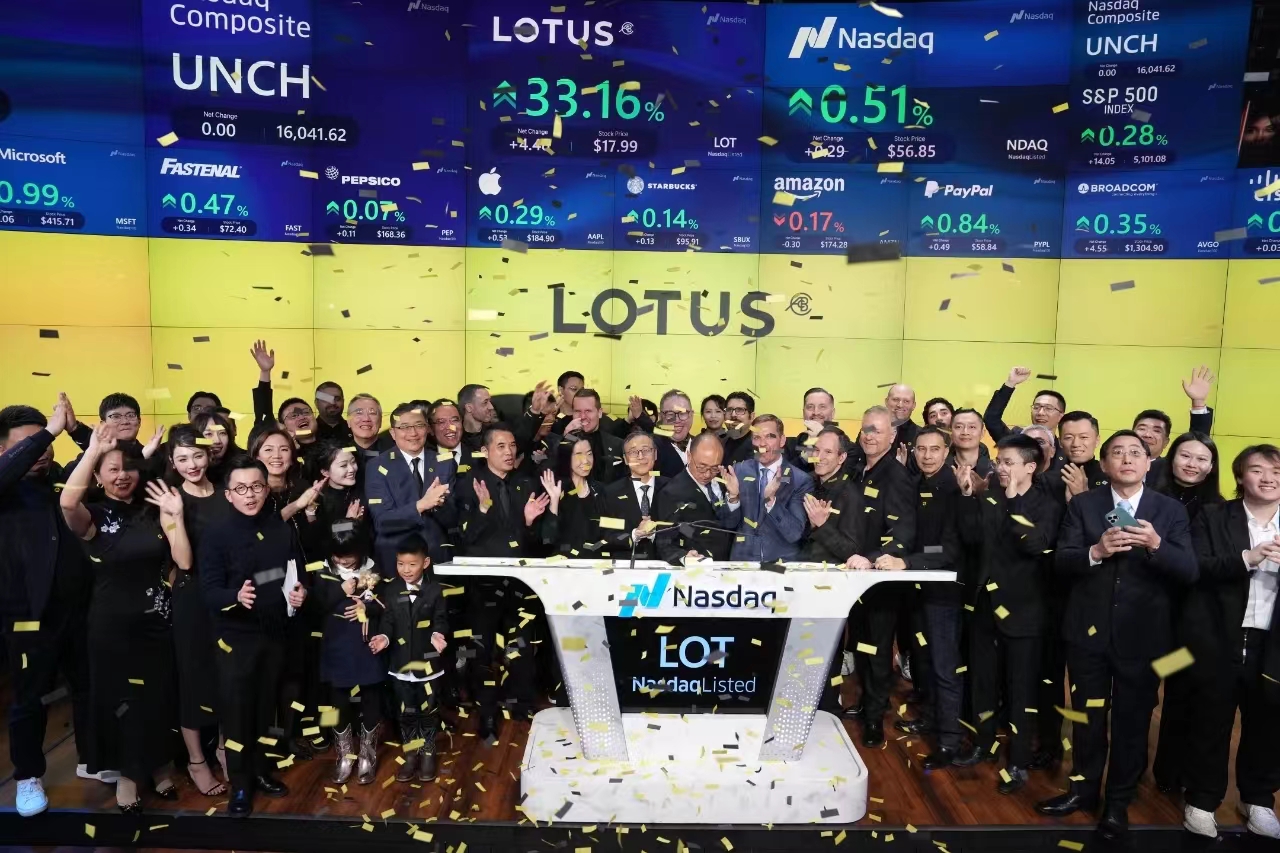 Lotus Tech’s Nasdaq Debut to Drive EV Maker’s Global Expansion, CEO Says
Lotus Tech’s Nasdaq Debut to Drive EV Maker’s Global Expansion, CEO Says(Yicai) Feb. 24 -- Lotus Technology’s listing on the Nasdaq marks a significant milestone in the electric carmaker’s journey and will accelerate its global expansion, Chief Executive Officer Feng Qingfeng told Yicai on the eve of its market debut.
The Shanghai-based luxury EV maker owned by China's Geely Holding completed its planned merger with Nasdaq-listed L Catterton Asia Acquisition, a special purpose acquisition company this week and the combined entity’s stock started trading yesterday.
Some 670 million shares outstanding after the merger completes, giving Lotus Technology equity valuation close to $7 billion according to the latest filing paper. The proceeds will go on innovating products, developing next-generation technologies, expanding its global distribution network, and general corporate purposes.
Feng said that although Geely is the automaker’s controlling shareholder and has invested in production facilities in the Chinese city of Wuhan, Lotus, with its British heritage and renowned for its high-performance cars, remains a truly global enterprise.
Lotus has developed its own electrification architecture, intelligent chassis, set up an innovation center in Germany, and operates a design and marketing center in the United Kingdom, he added.
Lotus still has four to five years to achieve its Vision80 strategy, an ambitious roadmap set out in 2018 that envisions a shift toward vehicle electrification and intelligence, Feng said.
Bigger Overseas
Feng sees a time when Lotus Tech’s international footprint will surpass its stronghold at home, with projections indicating that 60 percent of the company’s sales and revenue will come from overseas, notably the United States, by 2025.
Lotus Tech has entered the markets of Southeast Asia, the Middle East, Australia, New Zealand, Japan, Europe, and the United Kingdom. It will enter the South Korea in the second half and will bring the Electre, its pure electric sport utility vehicle, to the US, the world's second-largest auto market and the biggest for luxury cars, in the third quarter.
Based on the strong orders that the Emeya saloon had in the US last year, Feng expressed confidence in this move.
In Feng’s view, EVs priced at more than USD80,000 apiece accounted for about 7 percent to 8 percent of new cars in China last year, penetrating at a slower pace than the industry average but indicating high potential with its high growth. Moreover, overseas markets have a higher penetration rate for high-end EVs priced above USD80,000, he said.
Lotus Tech’s sales channels will increase from more than 200 at present to over 300 by 2025, further pushing into the market, Feng added.
The firm aims for annual sales of 150,000 by 2028, when the Vision 80 strategy concludes, with models such as the gas-powered Emeya priced at between CNY668,000 and CNY1.18 million (USD105,000 and USD186,000), the performance car Emira at CNY902,800 to CNY1.12 million, the all-electric Hyper SUV Electre at CNY728,000 to CNY1.03 million, and the electric hypercar Evija at CNY21.2 million (USD3.4 million).
Lotus Tech sold 576 vehicles in 2022 and notched up 17,000 orders in the first half of last year.
Standing Out
Highlighting the brand's focus on exclusivity, Lotus Tech is focused on the luxury market with prices ranging from USD80,000 to USD150,000, Feng said. He indicated that the automaker has yet to entertain the idea of introducing any mid-range vehicles.
Assessing the Chinese auto market, Feng acknowledged the fierce level of competition while emphasising the importance of product distinctiveness. With its 75-year legacy, Lotus remains synonymous with aerodynamics, lightweight construction, and superior handling, he said, adding that despite the challenges posed by electrification, including increased battery weight, the brand steadfastly upholds these defining traits.
Responding to consumer demands for advanced features, Feng revealed that Lotus has rolled out self-driving capabilities in over 60 cities across China and aims for nationwide coverage by the year's end, with plans to introduce the navigate on autopilot feature in urban centers.
“Our focus is on performance cars,” Feng said. “That’s our core ethos and positioning. Building upon this foundation, we offer performance-driven daily drivers, electric vehicles, and smart autos.”
Editor: Tom Litting